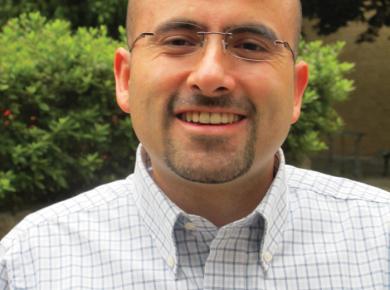Posted: October 7, 2014
Some months ago I had the privilege of visiting our churches in Malawi. There we were, along with delegates of several local Brethren in Christ (BIC) congregations, gathered under a tree in order to worship God and speak about our global communion. After a vibrant time of worship I had the opportunity of speaking about following Christ in our worldwide Anabaptist family. Then a pastor raised his hand and asked: How can we follow Christ in contexts of poverty, economic inequality and intense financial needs?
That was a hard question. What could I say – as a comparatively wealthy Latin American – to my brothers and sisters facing such a difficult context? In Malawi there are around 4,500 baptized members in about 46 local congregations. All of them face low life expectancy, high infant mortality, increasing statistics of HIV/AIDS and lack of financial resources.
All these facts, plus the images of the immense financial resources that we have in other parts of our global family, came to my mind when I considered how to respond. After leaving our meeting a clear thought came to my mind: This church already had the response to the pastor’s question. Generosity that balances economic inequalities brings hope and practical ways of overcoming this inequality. Some days before our service under the tree I attended another service in Blantyre, one of the main cities of Malawi. I was amazed when there was the time of offering. Every member (children included) got out of their chairs and went to the front to deposit their donation. Not a single person stayed seated! The joy and hope expressed in worship that followed that time of offering amazed me. Generosity, I thought – generosity of resources, and generosity of spirit in worship to God – is the answer to the pastor’s question.
Generosity is an action that transcends economic inequalities to bear fruit as hope. Generosity proves that the immediate situation can be overcome. This is one of the reasons why these two topics (hope and economic inequality) are related in this issue of Courier/Correo/Courrier. Through generosity, our global community can find hope in the midst of our economic inequalities. How could this happen?
First, we could follow the words of the German theologian Jürgen Moltmann, writing in his book Ethics of Hope (Fortress Press, 2012): “Perceive things not just as they have become and now exist but also in the different ways they could be.” Our life needs to be eschatologically oriented. We can look to the future that is revealed by God – a future without economic inequality – and, in this light, denounce, criticize and look for ways of changing current circumstances that contradict such a future. As Johannes Baptist Metz and James Matthew Ashley claim in their book Faith in History and Society (Crossroads Publishers, 2007), the imminent coming of a final point in history – a point in which justice and restoration will be a present reality – brings hope and strength in order to transform current realities of injustice, suffering, and oppression.
Second, we need to be set free from the world around us, and resist its pressures. Consumerism and identity based on materialism are modern idols that feed inequalities. We can destroy them through the practice of generosity. Moltmann affirms: “People who expect God’s justice and righteousness no longer accept the so-called normative force of what is fact, because they know that a better world is possible and that changes in the present are necessary. Being able to wait means resisting the threats and seductions of the present, not letting oneself be brought into line, and not conforming.”
Third, we must find a new identity and fellowship. This new identity must be more important for us than the old one. “We are Christians first of all, and only after that are we members of our own particular country,” concludes Moltmann. This means we should develop a Kingdom of God mentality instead of a nationalistic mentality. Let’s start to think as citizens of a new nation in which there is not a gap between rich and poor, but where economic equality exists between all people. Let’s start to experience the reality of this new Kingdom among us today. Our church is called to be a foretaste of this kingdom. Let us live it here and now!
César García, MWC general secretary, works out of the head office in Bogotá, Colombia

Join the Conversation on Social Media
FacebookTwitterInstagramFlickrYouTube